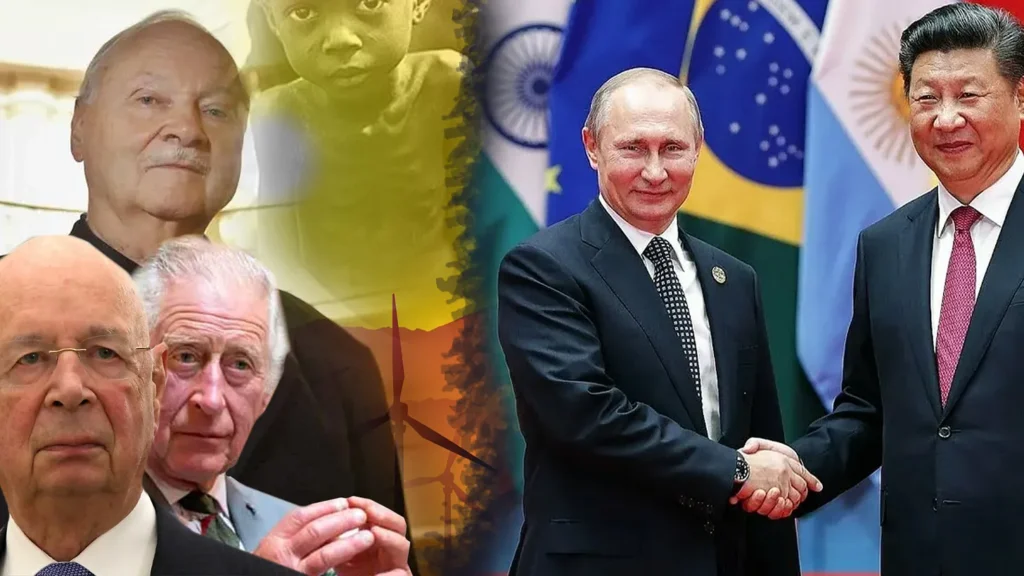Is the Multipolar Alliance ‘Controlled Opposition’? The Case of Two Green Paradigms
TRANSCEND MEMBERS, 31 Jul 2023
Matthew Ehret Insights – TRANSCEND Media Service
29 Jul 2023 – On 4 Feb 2022, Presidents Xi Jinping and Vladimir Putin unveiled a 5000 word ‘Joint Declaration on the International Relations Entering a New Era and the Global Sustainable Development.’
The words “sustainable development” tied to “international relations” have obviously caused more than a few concerned citizens of western nations to gasp in fear that these two Eurasian powers who are apparently in a conflict with the unipolar death cultists managing the NATO cage, are in reality, simply controlled opposition.
“Sustainable development” is, after all the term coined by Maurice Strong and other misanthropic fanatics to promote a policy of depopulation, under the rubric of ‘de-carbonization’ of industrial civilization.
For many people who have become conditioned by nominalist habits of thinking, hearing figures like Vladimir Putin and Xi Jinping using the same words as the leading priests of the liberal rules based order is sufficient evidence to leap to the judgement that they are all working together and that all multipolar resistance to the globalist cult is just an illusion.
But as I pointed out in my recent article ‘Communism, Capitalism and Feudalism: How Nominalism Makes us Fools’, two people can use the same word with two very different meanings associated with the common word.
What is more important than associating patterns, and definitions to words labelled onto processes is an understanding that processes themselves are given their value and essence by the intentions, designs and purpose of from the minds of those putting them into motion and not from any set of fixed definitions.
Fire in the hands of a sociopathic arsonist is a scary weapon while in the hands of a normal human is a great resource.
In the following essay, we will do what few black pilled analysts ever bother doing… we will explore at some length WHAT EXACTLY China and her allies are doing in physical reality.
We will review the physical economic, scientific, cultural and cognitive factors of the past, present and future trajectories of Eurasia as compared with the western states, and we will look for any evidence to support or reject the thesis that China, Russia, India and their allies are in cahoots with the supranational death cultists managing Davos.
Don’t be surprised if, in the course of this exercise, you discover that there is not one, but two diametrically opposing concepts underlying the term “sustainability” and “world order” currently at play.
The 2009 Sabotage of a Green World Government
Before we begin, it should be recalled that China and India were instrumental in sabotaging the December 2009 COP14 agenda in Copenhagen which had promised to establish legally binding emission target cuts to guide the de-carbonization (and de-industrialization) of much of society. Amidst a supposed pandemic and economic meltdown, puppet leaders like Sarkozy, Merkel and Obama championed a new era of green global governance and promised to consolidate a legally binding treaty to enforce decarbonization onto the nations of the globe. But it didn’t happen.
Why not?
The London Guardian had reported in 2009 that “Copenhagen was a disaster. That much is agreed. But the truth about what actually happened is in danger of being lost amid the spin and inevitable mutual recriminations. The truth is this: China wrecked the talks, intentionally humiliated Barack Obama, and insisted on an awful ‘deal’ so western leaders would walk away carrying the blame.”
The London Guardian continued:
“To those who would blame Obama and rich countries in general, know this: it was China’s representative who insisted that industrialised country targets, previously agreed as an 80% cut by 2050, be taken out of the deal. ‘Why can’t we even mention our own targets?’ demanded a furious Angela Merkel. Australia’s prime minister, Kevin Rudd, was annoyed enough to bang his microphone… The Chinese delegate said no, and I watched, aghast, as Merkel threw up her hands in despair and conceded the point… China, backed at times by India, then proceeded to take out all the numbers that mattered. A 2020 peaking year in global emissions, essential to restrain temperatures to 2C°, was removed and replaced by woolly language suggesting that emissions should peak ‘as soon as possible’.”
Apparently China and India, along with African governments like Sudan (which had not yet been carved up on the careful watch of Rhodes Scholar Susan Rice) did not wish to sacrifice their industry and national sovereignty on the altar of climate change models and technocrats that had only weeks earlier been publicly exposed as frauds by East Anglia University researchers during the embarrassing Climategate scandal.
While China and India should be celebrated for having sabotaged this effort (and the subsequent efforts to impose legally binding treaties in 2021 or 2022), very few people have been able to hold this drama in their memory, and fewer still realize how this fight over sovereignty was tied to 1) the right of all nations to develop without engaging in culling their people, 2) supporting the right of sovereign nations to supersede edicts of globalist institutions and 3) a rejection of the New World Order script outlined by the likes of Bush Sr, Kissinger and Biden in 1992[1].
Imposing Limits to Growth onto Humanity: Derailing Nuclear and Space Economics
Under the post-industrial logic of the Trilateral Commission agents that took over the reigns of government in the 1970s, a full spectrum program was unleashed that shattered the spirit of progress that once animated a vibrant western culture. The creative momentum towards new breakthroughs in nuclear fission and fusion power, space tech and assisting former colonial people in their aspirations for industrial progress was systematically sabotaged as a new logic of scarcity management, population reduction and global governance was made the top priority for all US foreign and domestic policy.
Funding for advanced breakthroughs in space science was destroyed with the cancellation of the Apollo missions in 1973.
Where NASA’s ‘crash science’ methods formerly drove the entire economy towards nonlinear bursts of growth through expanding fields of new discoveries touching on every aspect of life[2], the funding collapsed by design from 4% of GDP/year in 1965, to less than 1% by 1975 [see graph].
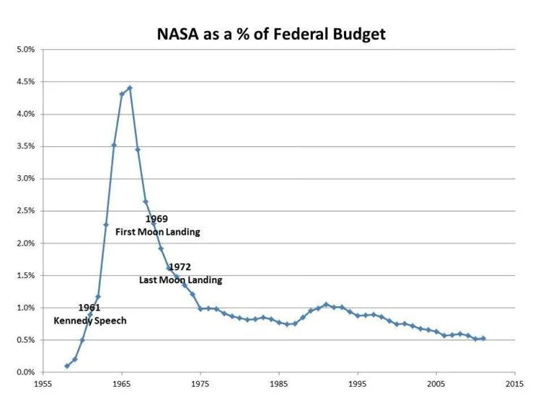
Just as the limits to growth were imposed onto humankind’s quest to become a space-driven species on the macro scale, breakthroughs in atomic energy were also sabotaged with the cancellation of hundreds of new reactor builds in the late 1970s, while research and development into next generation reactors, nuclear propulsion for deep space exploration, fusion power, and closing the nuclear cycle using fast breeder reactors were cancelled under President Carter.
Fusion funding was cut so deeply during this time, that scientists were deprived of the means of building prototypes to test their ideas resulting in a deep demoralization and idiotic “truism” that commercial fusion power “would always be 30 years away”.

Heavy industry was outsourced under a new logic of “cheap labor” and the formerly economic independent nations of the west became ever more dependent upon sweat shops, child labor and increasing rates of unpayable debts.
Henry Kissinger pulled every string to ensure that the world would remain addicted to hydrocarbons which became the basis upon which a new era of asymmetric war and economic terrorism under the guise of the petro-dollar would be unleashed.
The only groups to benefit were those ‘stakeholders’ prancing about the Bilderberger or Davos who wished to transform once viable economies into speculative, hollowed-out time bombs whose detonation decades later would ensure a traumatic shock to the zeitgeist sufficient to usher in a new post-nation state world order.
As we saw in part two of this series, this was the trap which Kissinger, Soros and the Trilateral Commission imposed onto Russia and China, during the 1980s and which China began resisting in earnest in 1989.
Resisting Malthus and Defending Open System Economics
Now let’s begin to see what China and other nations of the Multipolar Alliance are actually doing to reverse this trend towards decay, and artificial scarcity under their own particular re-definition of “sustainability”.
Unlike the post-modern basket cases in the west, Eurasian nations are not resting their entire development strategies on windmills and solar panels (although China has become a leader in the development of these things as well).[3]
Instead what we find are competent programs for hydropower, oil, coal, natural gas, hydrogen power and importantly next generation nuclear power (with pioneering work on Molten Salt thorium as well as fusion power in the works).
The Strategic Role of Nuclear Power
As of December 2021, China became the first nation to complete a fourth-generation high temperature pebble bed gas reactor in Shandong Province with over 93% of the material and all core technology domestically sourced.
While the United States relies on nuclear power for nearly 20% of its electricity base, ALL of this capacity was built up during the 1960s-1970s. Due to the takeover by a neo-Malthusian technocratic class under Presidents Nixon, Ford and Carter, not a single new construction was permitted between 1977 and 2013 as the USA (and Canada) was forced into a nuclear moratorium. The IER graph below showcases the direct effects of the Malthusian takeover and imposition of a system of artificial scarcity onto the formerly pro-industrial growth USA.
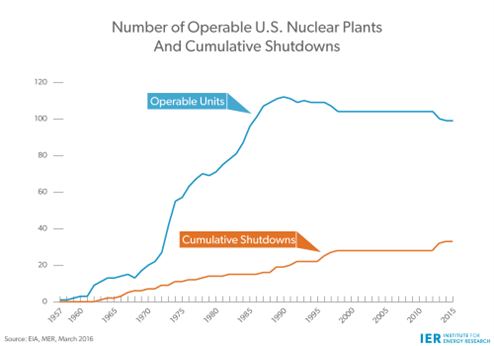
James Schlesinger was an important Trilateral Commission ideologue who would jump from the directorship of the CIA (1973) to the Department of Defense (1973-76) to head the Department of Energy (1977-79) where he oversaw the cancellation of nearly all nuclear projects planed for the 1980s. Why this particular individual was selected to carry his assignment can be seen in his 1960 book ‘The Political Economy of National Security’ where he outlined his concept of economics and the necessary future of the world saying:
“Economics is the science of choice in a world of limited resources…. We have gone around the world spreading the ‘gospel of plenty’ raising the level of expectations … [but] in the nature of things, these rising expectations can never be satisfied…. We must in our strategic policy return to the days before the Industrial Revolution … [and] prepare to fight limited wars.”
Schlesinger’s Canadian Kindred Spirit: Maurice Strong
In Canada, arch-Malthusian, Rockefeller agent and god-father of the Great Reset Maurice Strong had endorsed a nuclear moratorium while simultaneously acting as head of Petro Canada from 1976-78.
In a 1990 interview to West Magazine, Strong described a fiction book that he wanted to write. This book would take place amidst the meetings of a global elite where a grouping of enlightened elitists conspired to collapse industrial civilization to save nature. Strong said:
“What if a small group of world leaders were to conclude that the principal risk to the Earth comes from the actions of the rich countries? And if the world is to survive, those rich countries would have to sign an agreement reducing their impact on the environment. Will they do it? The group’s conclusion is ‘no’. The rich countries won’t do it. They won’t change. So, in order to save the planet, the group decides: Isn’t the only hope for the planet that the industrialized civilizations collapse? Isn’t it our responsibility to bring that about?”
The 1992 Rio Summit overseen by Maurice Strong had established a new era in the consolidation of NGOs and corporations under the “green” agenda. This doctrine was formalized with Agenda 21 (later renamed Agenda 2030) and the Earth Charter, co-authored by former Soviet Premier Mikhail Gorbachev, and Strong between 1996-2000. The International Earth Charter drafting Committee was chaired by none-other than transhumanist billionaire Steven Rockefeller.
Mikhail Gorbachev had played his role marvellously for his handlers, and under his liberalizing reforms, armadas of George Soros’ Open Society Foundations, and other CIA front groups had a field day taking control of everything that moved in the former Soviet space.[4]
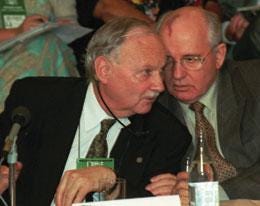
After the RIO conference, Strong went on to his next assignment heading Canada’s nuclear power sector as the head of Ontario Hydro from 1992-1995 where the aging Malthusian went to war with the entire Canadian nuclear industry using every dirty trick to cancel refurbishments, designs for new constructions and all funding in research and development in favor of “sustainable” energy pathways.
While some of Strong’s damage was undone after his departure, the wounds were deep and Canada still hasn’t healed to this day, having witnessed a consistent decay of its once-vibrant nuclear industry and total destruction of its fusion energy efforts.
USA vs China Energy Paradigms
In the USA, overall national energy production has not only stagnated but has actually fallen from 26,545 Terrawatt hours (TWh) in 2000 to 25,825 TWh in 2021 with an increased slide projected into the coming decades by those same forces who 1) sabotaged America’s advanced energy policies over the past decades and 2) wish to induce energy scarcity onto a frightened populous in order to justify a culling of humanity to “sustainable levels”.
In contrast, China has used this same 21 year interval very differently, increasing its annual energy use from 12,470 TWh in 2000 to 43,791 TWh in 2021.
The effects upon quality of life, per capita powers of labor, energy security, food production and educational opportunities have increased dramatically. The one child limit (imposed by Kissinger and the Club of Rome 40 years ago) has been abolished and average longevity which was once led by the USA has been overtaken by China which has lifted the average life expectancy from 44 years in 1963 to 77. 5 years today stands in stark contrast to the USA whose average life expectance fell to only 76.1 years of age as of September 2022. China’s purchasing power parity has also superseded that of the USA over the past few years [see graph below]
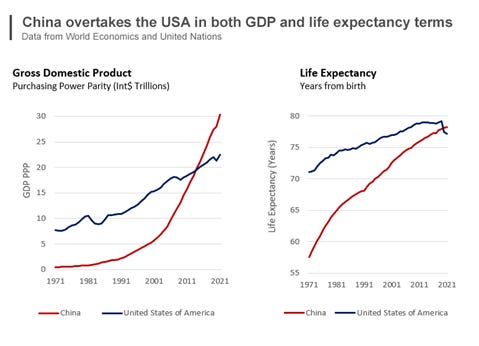
Graph from worldeconomics.com
The dramatic increase of a middle class which totalled only 3% of the Chinese population in 2000 to become 54% today are just a few effects of this overall energy policy. One finds that each one of these factors has intentionally been reduced across the Trans Atlantic West over the course of the same period. If we take the 32 period between China’s 1989 expulsion of George Soros to the present, we find a ten-fold increase of incomes and labor productivity on top of a thirteen fold increase of GDP.
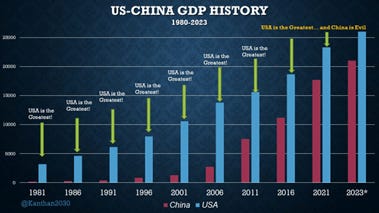
US-China GDP 1981 to 2022. And forecast for 2023 (based on World Bank/IMF).
Graph made by SL Kanthan for Trends in Geopolitics.
While nuclear is costly and takes several years to finish an average 1-4 Gigawatts plant, the fact remains that it is the most efficient form of energy that takes up fractions of land (compared to solar or wind farms), and operates at 90% capacity even when there is no wind or sun. On the other hand, solar and wind farms operate at an average of 25-35% respectively on the windiest or sunniest of days. Despite this embarrassing performance, when the wind doesn’t blow, those wind turbines can fall to less than 2% capacity (as they did in the UK recently) resulting in exploding energy price and black outs.
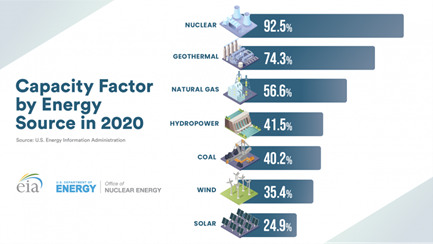
China on the other hand hasn’t drunk Green New dealing kool aid, and instead thinks of energy in qualitative terms which is why the Chinese government has made nuclear power a top priority for its coming 15-year-energy-strategy.
On Nov. 2, 2021, Bloomberg reported that “China is planning at least 150 new reactors in the next 15 years. More than the rest of the world has built in the last 35.”
India meanwhile has 23 reactors in operation and will add 12 more by 2024. Among those new designs built and operational in India are the fast breeder reactors imported from Russia which opens up the door for India’s use of the abundant thorium-233 found under Indian soil which will be used as part of India’s new three-step nuclear designs. Between 2012-2021, Russia constructed 19 new reactors, 15 of which have been built in former colonial nations abroad.
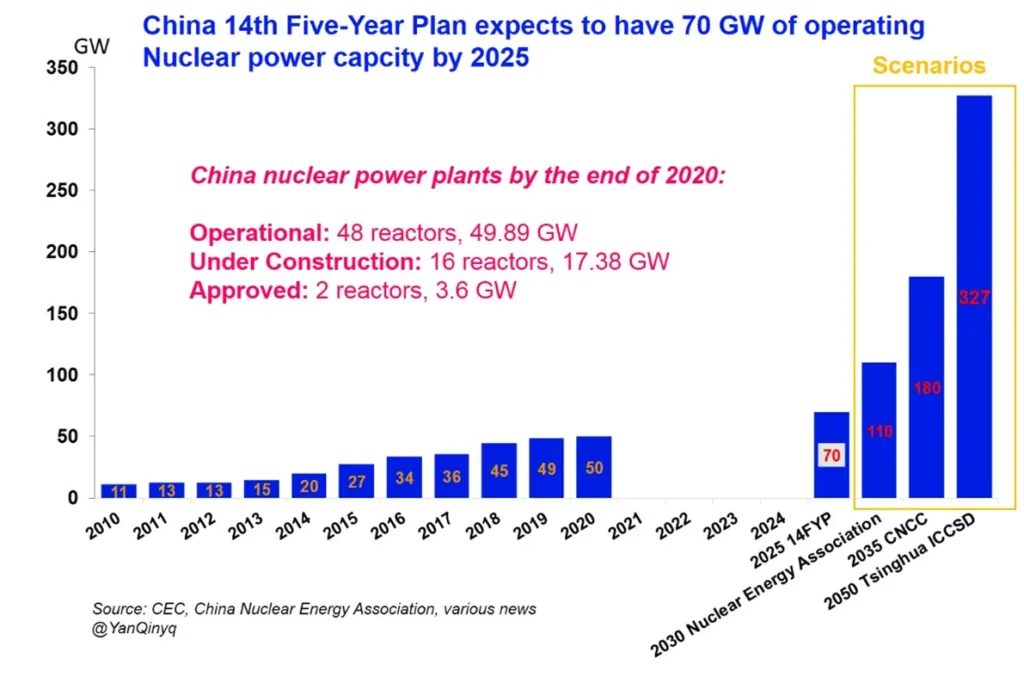 Other nations collaborating with the Multipolar alliance have also seen the birth of a nuclear renaissance. Of those nations now making the leap into nuclear power development, we find the UAE, Saudi Arabia, Indonesia, Egypt and dozens of African nations whose leaders have all signed deals with Russia to construct nuclear power.
Other nations collaborating with the Multipolar alliance have also seen the birth of a nuclear renaissance. Of those nations now making the leap into nuclear power development, we find the UAE, Saudi Arabia, Indonesia, Egypt and dozens of African nations whose leaders have all signed deals with Russia to construct nuclear power.
While the USA is still ahead of China on per capita energy use with an average of 76,634 kilowatt hours used per person each year (compared to China’s 30,711 kWh), a very different picture emerges when we shift our focus to look not upon each nation in a crystalized state, but as a process of change. Here a stark contrast is seen when comparing the two nations.
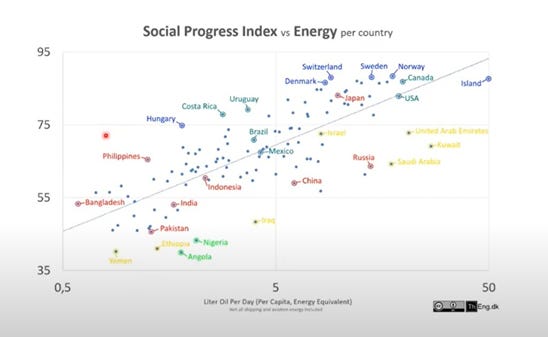
In the case of the USA, per capita energy has fallen below 1971 levels (which were 91,613 kWh per capita according to the Our World in Data), while China’s 1971 per capita energy use clocked in at a measly 3320 kWh. This is nearly a 1000% increase which says a lot considering China’s leadership has committed to tripling those levels by 2030!
Water Abundance vs Scarcity: China vs the West
One of the most overlooked components of China’s anti-zero-sum paradigm is a $76 billion megaproject called the “Move South Water North Project”.
Begun in 2001, the $64 billion water diversion project is the largest such program ever devised in human history. In order to bring much needed water from the flood prone, low-population density headwaters of the Yangtze River of the south to the highly populated industrial zones of drought-prone North, engineers have embarked on a project which aims to bring 44.8 billion cubic meters (1.5 trillion cubic feet) of water per year from the south to the North and Yellow River basin.
A CGTN overview of the megaproject can be seen here:
Divided into three routes, the first to begin construction was the Eastern Route upgrade of the Grand Canal bringing 12.6 billion cubic meters/year of water from the Yangtze via massive tunnels to avoid evaporation across 760 miles to Tianjin. This journey will take the water through 23 pumping stations, and provide 45.4 MW of power along the way. This route was completed in 2013.
The next route which was built between 2004-2014 is the Central Route diverting 9.5 billion cubic meters/year of excess water from the Danjiangkou Reservoir on the Han River to Beijing 765 miles away. This immense endeavor features the construction of two tunnels moving this water 65 meters below the Yellow River in its journey north.
Finally, the third Western Route will only be completed in 2050 and will bring water from the Yangtze and tributaries to the Yellow River passing through the Tibetan Plateaus.
While detractors of these projects focus only on the 330,000 people who were displaced due to these projects, it is undeniable that the flood controls, increased irrigation, and water availability for urban and industrial activity will save countless lives over the coming centuries.
This paradigm of water development, and conservation should be held firmly in mind when contrasting China’s philosophy of “sustainability” to that dominant amongst the technocrats managing a depopulated world order in the west.
The case of California here stands in contrast where years of droughts and lack of water infrastructure development have resulted in one of the largest food crises in US history (even before COVID was used to justify the destruction of supply chains).
Where great projects like the North American Water and Power Alliance once animated the best of western nation building, the murder of JFK and RFK put an end to this paradigm over 50 years ago resulting in several generations of California politicians who have put “saving desert ecosystems” ahead of saving people. The following presentation was delivered to a Russian audience in order to showcase the history of the sabotage of JFK’s comprehensive continental water strategy:
Not only have no new hydroelectric dams been built since the early 1980s in North America, current energy policies in California have focused on pouring $500 million into destroying four dams in order to “liberate the rivers and restore the natural deserts”, while depriving living human farmers and residents of vital water reserves and energy.
De-growth and depopulation of California dominate the thinking of the technocrat class and urban yuppies of the west without any regard to the suffering caused along the way.
China on the other hand has built four of the ten largest hydroelectric dams in the world during the past 25 years, and on June 14, 2022, Power China unveiled plans to build 200 new pumped hydro stations generating 270 GW of energy by 2025.
While the greens of the west have been trained to think only of deconstructing industrial civilization to save deserts (or destroy arable land by spreading solar panels over millions of acres thus increasing both heat and lifeless deserts on earth), the concept of “green” in Eurasia involves bringing life to deserts.
Looking to NASA’s recent surprise discovery that the world’s biomass has increased by over 5% due in large measure to India and China’s economic activity, the fact is slowly emerging into the zeitgeist that the apparent conflict between humanity’s aspirations to grow vs the health of ecosystems is a chimera. The obvious fact that carbon dioxide also happens to be considered by all chlorophyl-based life to be a delicious food should also not be lost in the rush to demonize CO2.
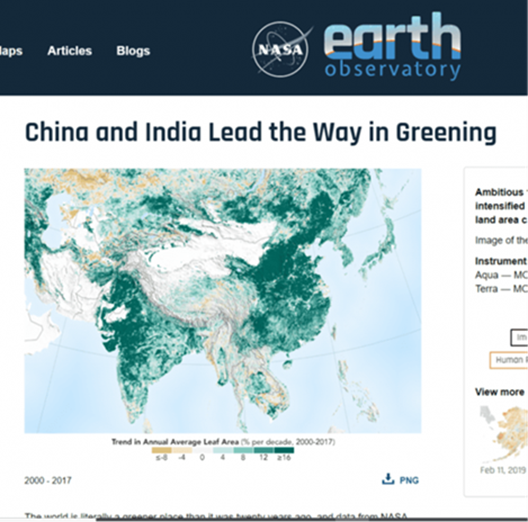
NASA Earth Observatory data demonstrated that the vast increase in global biomass is driven primarily by the large scale water and development projects led by China and India.
The New Silk Road vs Build Back Better
The Northern Corridor: Currently the most developed and utilized of the three corridors that make up the 4 trillion dollar Belt and Road Initiative (aka: New Silk Road), it consists of railways and pipelines that run from China to Kazakhstan, Russia, and Europe. Some Atlanticist geopoliticians would like to see this corridor shut down to further isolate ‘new enemy’ Russia’s transportation and commercial routes.
The Southern Corridor: Less developed but still important, this corridor involves the construction of continuous rail connections from China to Pakistan, Afghanistan, Iran, Iraq, Syria, Lebanon, and potentially Turkey, before reaching Europe through ports in Lebanon and Syria, and via land-based connections in Turkey.
This route has the potential to promote sustainable peace and reconstruction in West Asian nations, and could possibly be extended to integrate and industrialize the Persian Gulf states through large-scale high-speed railway projects like the 2000 km Persian Gulf-Red Sea high-speed railway, and hasten development prospects in the strategic Horn of Africa.
The Middle Corridor: The most complicated but no less essential of these arteries is the Trans-Caspian International Transport Route (TITR), dubbed “the Middle Corridor” and features multimodal rail and sea transit of goods from China to Europe via Kyrgyzstan, Turkmenistan, Azerbaijan, Armenia, Georgia, and Turkey.
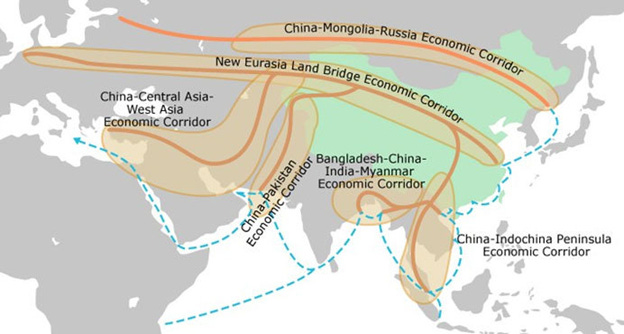
Although this path involves the shortest distance, complications and additional costs arise with the complex process of transitioning from land routes to sea routes via ports in the Caspian Sea.
In recent months, the nations along the Middle Corridor have worked to harmonize their interests and coordinate their efforts to tap, process, and move the energy resources in the Caspian Sea (which contains the fourth largest natural gas reserves in the world).
On 30 March 2022, a quadrilateral agreement was signed between Turkey, Azerbaijan, Kazakhstan, and Georgia to advance the construction of the Baku-Tbilisi-Kars railway system, the Baku-Tbilisi-Ceyhan pipeline, and the Trans Anatolian National Gas Pipeline (TANAP), which is already in operation. The TANAP is part of the larger Southern Gas Corridor, which involves seven countries and consists of 3500 km of pipelines worth $35 billion.
The importance of the INSTC
In addition to the three primary east-west corridors connecting China with the west, the much anticipated Russia-Azerbaijan-Armenia-Iran-India International North-South Transport Corridor (INSTC) has also seen significant growth in recent years, with an additional eastern extension now stretching from Russia to Kazakhstan, Turkmenistan, Kyrgyzstan, Iran, and India.
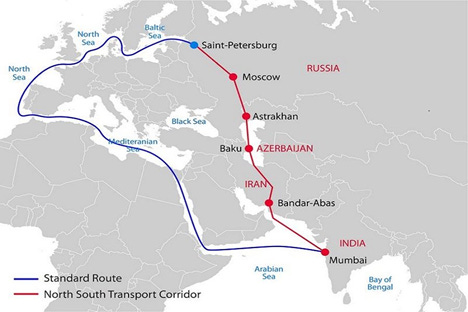
The International North South Transportation Corridor stetches from the Russian north to India with dozens of secondary corridors, pipelines, rail and industrial zones along the way which is synched up with the typically east-west New Silk Road.
Once goods from Russia reach Iran via either the western or eastern branches of the INSTC, they can be delivered to markets in India, South Asia, and East Africa through the Ports of Chabahar and Bandar Abbas on the Indian Ocean.
Contrary to the claims of some Atlantic Council-affiliated analysts, the east-west BRI corridors and the north-south INSTC are highly synergistic and united in a grand strategic outlook for broad Eurasian growth and integration in a post-zero-sum game world order.
The effects of these categories of programs involve 1) empowering sovereign nations in opposition to privatized central banks, 2) uplift people to better standards of living with greater intelligence, 3) increase abundance rather than scarcity, 4) induce peaceful cooperation instead of divide-to-conquer programs used by empires since time immemorial.
The Unipolar Green BRI Doppelganger
In contrast to this healthier multipolar operating system, a pathetic concept called “Build Back Better” was introduced. The oft-repeated term was ambiguously defined, but it was embraced by technocratic leaders of Atlanticist states, including the USA’s Joe Biden, Canada’s Justin Trudeau, the UK’s Boris Johnson, and the EU’s Ursula von der Leyen. The concept was later rebranded as “Build Back Better for the World” (B3W).
Despite its warm and fuzzy image, the Global Green New Deal and B3W failed to gain traction due to a lack of concrete action plans or details on how to finance and demonstrate the viability of the grand vision.
In March 2021, Biden and Boris Johnson unveiled a new program called the “Green Belt Initiative,” which they described as a response to China’s Belt and Road Initiative. When asked for details on how to fund the $3 trillion in investments required to make the “green transition” to a world dependent on solar panels and windmills, no specifics were provided.
Once again, the concept was under defined, but the image presented was one of a green revolution expected to usher in a new era of “clean zero carbon infrastructure” led by utopian rules-based orderistas of the transatlantic west.
Within the framing of the B3W branding, “Global Green New Deal” was often celebrated as a warm and fuzzy concept which former Bank of England Governor Mark Carney heralded as a $130 trillion renaissance into a post-hydrocarbon age.
In September 2021, the EU’s Ursula von der Leyen announced the “Global Green Gateway” as Europe’s response to the BRI. However, this initiative faced criticism for ignoring the hundreds of thousands of engineers trained by China in Africa over the past decade, and for projecting the historic predatory lending practices of Europe onto China.
Von der Leyen stated: “We want to create links and not dependencies… It does not make sense for Europe to build roads between a Chinese-owned copper mine and a Chinese-owned harbor.”
Despite this, the Global Green Gateway failed to propose a viable lending mechanism or staff, and soon faded away, similar to the Build Back Better and Global Green New Deals before it.
On 26 June, 2022, the global situation had changed dramatically as Russia’s military intervention in Ukraine was already four months old and the erection of a new Iron Curtain attempting to cut Europe off from both Russia and China was in full swing. Despite these developments, the demand for nations to access affordable and reliable energy and food had risen higher than ever.
In response, the White House released its newest rebranding of the B3W in the form of a G7-led program now titled “The Partnership for Global Infrastructure and Investment”.
This program promised $600 billion over five years to recipient nations in Africa, Southwest Asia, Latin America, East Asia, and Eastern Europe to build digital infrastructure, telecommunications, green energy, and soft infrastructure with a focus on gender equity.
The goal of this program was to provide poor nations with an alternative to China’s alleged predatory lending ambitions. However, few of the nations offered this “life raft” have shown much interest so far.
International Dynamics: Open vs Closed Systems Clash
The Belt and Road Initiative has already won over much of Africa as BRI-connected rail, ports, and other infrastructure are providing a breath of fresh air to nations long held hostage by IMF/World Bank conditionalities. Pakistan and much of Southwest Asia are also increasingly on board the BRI through the growing China-Pakistan Economic Corridor. Twenty Arab states consolidated massive BRI infrastructure projects over the past three years with Iran finalizing a $400 billion deal with China in July 2021, and even western controlled puppet states like Turkey and Saudi Arabia realizing their lack of future within the collapsing unipolar order grabbing the opportunity to join the New Silk Road.
Additionally, much of Latin America has also joined with hundreds of billions of dollars of infrastructure projects with China holding controlling stakes in over 40 strategic ports across Latin America
Although China is often accused of intellectual theft, the reality is that it has begun to clearly outpace western nations becoming a pioneer on every level of science and technology. China now registers more patents than the USA, has become the cutting-edge leader of high speed rail engineering with over 30,000 km (the USA has less than 200km and Canada has zero),
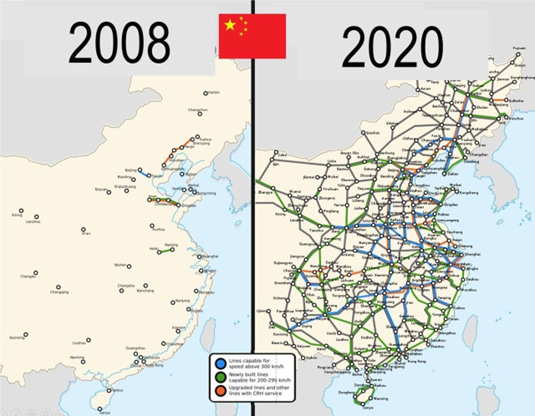
The growth of China’s high speed rail network is hyperbolic having not existed in 2001 and having grown to 30,000km as of this writing.
China has set records for bridge building, tunneling, as well as water management, quantum computing, AI, advanced telecommunications, and even space science becoming the first nation to ever land on the far side of the moon with an intent to mine Helium-3 and develop permanent bases on the Moon alongside Russia in the coming decade.
The unification of China’s space program, lunar development and Mars agenda which are integrated with Russia are not coincidentally tied to China’s commitment to tap into the moon’s abundant helium-3 resources which are nearly non-existent on earth due to our planet’s intense magnetic field.
Science journalist Jeremy Beck wrote of China’s space/fusion program in the following terms:
“Professor Ouyang Ziyuan, the chief scientist of the Chinese Lunar Exploration Program (CLEP), has said that the Moon is so rich in He-3, that this could ‘solve humanity’s energy demand for around 10,000 years at least.’ While talking about the Moon’s reserves of iron and other metals, Ziyuan particularly drew attention to He-3, which he called ‘an ideal fuel for nuclear fusion power, the next generation of nuclear power.’ He added, ‘It is estimated that reserves of helium-3 across Earth amount to just 15 tonnes, while 100 tonnes of helium-3 will be needed each year if nuclear fusion technology is applied to meet global energy demands. The Moon, on the other hand, has reserves estimated at between one and five million tonnes’.”
Some closing thoughts
If any of the above elementary facts surrounding the economic projects built in Eurasia were more well known in the western media landscape, I believe that it would be much more difficult to either 1) Demonize Russia or China as the cause of our problems or 2) posit that the multipolar alliance is just another depopulation-fixated controlled opposition committed to global enslavement.
As I said at the beginning of this report, similar words might be used by representatives of either side, but the meaning, design, purpose and intention shaping the substance of these words represents two very different visions for the future.
Now that we have observed what China, Russia, India and other members of the multipolar alliance are actually doing, how they are doing it and why, it hopefully has become clearer that the Eurasian/multipolar operating system is incompatible with the ancient formula for depopulation, war and stupidification used by oligarchy’s for thousands of years.
With a sense of the physical economic dynamics shaping both open vs closed systems in combat over the contours of the coming post-globalization age, we are now well placed to review the competing concepts of regionalization, “custom unions” and “world order” which have shaped the entire sweep of the 19th, 20th and early 21st century.
In the next segment of ‘Why the Multipolar Alliance doesn’t want to kill you’, Cynthia Chung will compare the concepts of “regionalisation” as expressed by the toxic anti-nation state traps of NAFTA or the European Union in contrast to associations affiliated with the multipolar alliance such as the Eurasian Economic Union, China’s Regional Comprehensive Economic Partnership, New Silk Road, BRICS, SCO, CELAC, and African Union.
[1] Despite paying lip service to the Paris Climate Accords, in 2022 China increased coal production by 9%, natural gas production by 6.4%, electricity generation by 2.2% and power consumption by 3.6%. While the post-industrial west is gripped by a top down shut down of fertilizer use and financial support to non-green energy systems under ‘Green New Deals’, China has gone in the opposite direction by increasing agriculture output and farming-associated energy consumption by 10.4% over 2021.
[2] Just some of the non-linear effects of the space program which we take for granted include: GPS, cell phones, medical technologies like ECGs, lasek eye surgery, artificial limbs, new materials processing, microwave technology, 3D printing, aeroponic agriculture, water purifiers, air purifiers, and the internet (to name a few)
[3] Windmill and solar energy are less than useless for supporting heavy industry but are adequate forms of energy for providing basic civilian electrical needs for household appliances. China understands this elementary fact. The “collective west” on the other hand seems to believe that all industries can become dependent on green energy which is scientifically impossible. As demonstrated in Michael Moore’s Planet of the Humans, one cannot create windmills or solar panels (which include vast mining requirements) utilizing wind or solar energy making them the very opposite of “renewable”.
[4] Another paradox which black pilled analysts avoid when advancing their thesis of “Russia and China are a part of the New World Order” is: Why did the Gorbachev-Yeltsin program of unbounded destruction not continue after 2000? Why did so many of those oligarchs who rose to power under the IMF/CIA/Soros 1990s get sent to jail or exiled? And while we’re at it, why were the NED and Soros banned from Russia in 2015?
____________________________________________
 Matthew Ehret is a member of the TRANSCEND Network for Peace Development Environment, a journalist, and co-founder of the Rising Tide Foundation. He is the Editor-in-Chief of Canadian Patriot Review, Senior Fellow at the American University of Moscow and host of The Great Game on Rogue News. He has authored the book series The Untold History of Canada and the recently published book series The Clash of the Two Americas. Email: matt.ehret@tutamail.com
Matthew Ehret is a member of the TRANSCEND Network for Peace Development Environment, a journalist, and co-founder of the Rising Tide Foundation. He is the Editor-in-Chief of Canadian Patriot Review, Senior Fellow at the American University of Moscow and host of The Great Game on Rogue News. He has authored the book series The Untold History of Canada and the recently published book series The Clash of the Two Americas. Email: matt.ehret@tutamail.com
Go to Original – matthewehret.substack.com
Tags: China, European Union, Green New Deal, India, NASA, NATO, Russia, Sustainability, USA
DISCLAIMER: The statements, views and opinions expressed in pieces republished here are solely those of the authors and do not necessarily represent those of TMS. In accordance with title 17 U.S.C. section 107, this material is distributed without profit to those who have expressed a prior interest in receiving the included information for research and educational purposes. TMS has no affiliation whatsoever with the originator of this article nor is TMS endorsed or sponsored by the originator. “GO TO ORIGINAL” links are provided as a convenience to our readers and allow for verification of authenticity. However, as originating pages are often updated by their originating host sites, the versions posted may not match the versions our readers view when clicking the “GO TO ORIGINAL” links. This site contains copyrighted material the use of which has not always been specifically authorized by the copyright owner. We are making such material available in our efforts to advance understanding of environmental, political, human rights, economic, democracy, scientific, and social justice issues, etc. We believe this constitutes a ‘fair use’ of any such copyrighted material as provided for in section 107 of the US Copyright Law. In accordance with Title 17 U.S.C. Section 107, the material on this site is distributed without profit to those who have expressed a prior interest in receiving the included information for research and educational purposes. For more information go to: http://www.law.cornell.edu/uscode/17/107.shtml. If you wish to use copyrighted material from this site for purposes of your own that go beyond ‘fair use’, you must obtain permission from the copyright owner.
